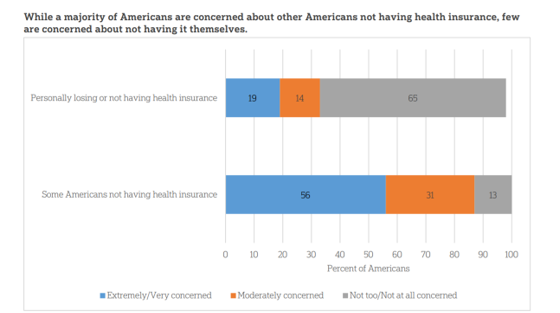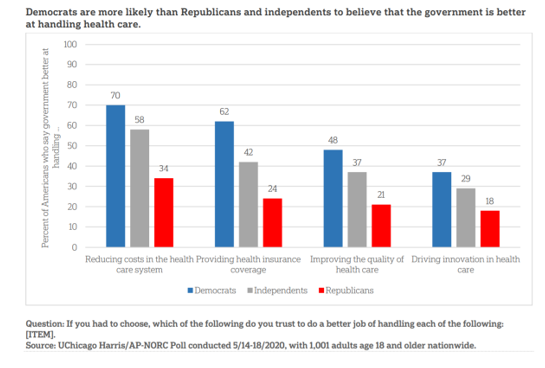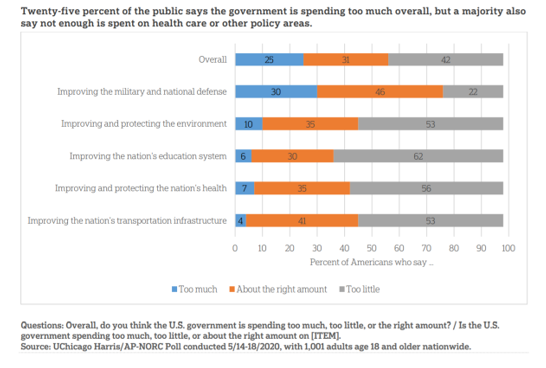The coronavirus pandemic has further opened the kimono of the U.S. healthcare system to Americans: four months into the COVID-19 outbreak, most consumers (62%) of people in the U.S. are more concerned about other people not having access to high quality health care versus themselves.
 This is a 16 point increase in concern in May 2020 compared with the response to the same question asked in February in a poll conducted by the University of Chicago Harris School of Public Policy and The Associated Press-NORC Center for Public Affairs Research (the AP-NORC Center).
This is a 16 point increase in concern in May 2020 compared with the response to the same question asked in February in a poll conducted by the University of Chicago Harris School of Public Policy and The Associated Press-NORC Center for Public Affairs Research (the AP-NORC Center).
The AP-NORC Poll found more of this “my brother’s keeper” health care ethos, shown in the first chart: 87% of Americans said they were concerned about some Americans not having health insurance, compared with only 33% of people concerned about personally losing or not having a health plan.
A third data point on health care empathy was that more Americans were concerned about Americans having access to high quality care when needed compared with access to quality care for themselves.
Access to testing and care during the COVID-19 outbreak also exposed patients to health care spending concerns. Three in four consumers are concerned about how much the U.S. spends on health care, versus one-half concerned about how much they themselves spend.
 Thinking more deeply about health care spending, Americans were split on how health insurance should be structured in terms of premiums versus out-of-pocket spending, broader versus “thinner” coverage of services, and tighter or looser provider networks. The second vertical bar chart illustrates these three aspects, showing that lower costs/higher premiums, broader coverage of treatments, and tighter provider networks garnered slightly more favor among health consumers.
Thinking more deeply about health care spending, Americans were split on how health insurance should be structured in terms of premiums versus out-of-pocket spending, broader versus “thinner” coverage of services, and tighter or looser provider networks. The second vertical bar chart illustrates these three aspects, showing that lower costs/higher premiums, broader coverage of treatments, and tighter provider networks garnered slightly more favor among health consumers.
Most Americans would also choose to pay less for health care and prescription drugs — even if that translated into higher taxes
and less innovation. This is an important question because the U.S. (and its taxpayers) fund a large proportion of the world’s health care innovation in the forms of research and higher costs of prescription drugs borne by patients and the nation’s health care system.
Most Americans say the private sector would be better at innovation in health care than the government would be. Most people also feel that the private sector would be better at bolstering quality in health care.
 However, the government has the edge in the ability to reduce costs in the health care system.
However, the government has the edge in the ability to reduce costs in the health care system.
Across all four aspects of “doing a better job handling” health care” — reducing cost, providing health insurance coverage, improving quality, and driving innovation — more Democrats give government higher ratings than Independents or Republicans do.
The study also identified large differences between Democrats and Republicans regarding how much the country spends on health care, as well as the balance between paying less or more in taxes and/or for health care.
A significant majority of Democrats believe not enough is spent on health care; less than one-third of Republicans agree.
Regardless of political party, the bottom line is that Americans who identify as being in poor or moderate health are most likely to be concerned about not having health insurance.
 Health Populi’s Hot Points: My hypothesis, which will be tested over the coming months leading to the November 2020 elections, is that COVID-19 has inspired millions of Americans to feel greater “health/care empathy” for their fellow citizens.
Health Populi’s Hot Points: My hypothesis, which will be tested over the coming months leading to the November 2020 elections, is that COVID-19 has inspired millions of Americans to feel greater “health/care empathy” for their fellow citizens.
Could it be that in the pandemic experience, people in the U.S. are growing muscles and demand for health citizenship? That is, that more people in the U.S. view health care as a civil right, which should be guaranteed to all American citizens?
This last chart illustrates peoples’ responses to the question, “Do you think the U.S. government is spending too much, too little, or the right amount?” on national defense, the environment, the education system, the nation’s health, and the transportation infrastructure.
Most Americans say the government is spending “too little” on, first, education, then the nation’s health, and transportation, and the environment tied for third.
Education, transportation and the environment all feed into the social determinants of health which underpin “the nation’s health.” Baking these public policies into national spending in the context of a U.S. National Agenda for Health and Well-Being would help to bolster Americans’ health citizenship…in and beyond the age of COVID-19.




 I'm gobsmackingly happy to see my research cited in a new, landmark book from the National Academy of Medicine on
I'm gobsmackingly happy to see my research cited in a new, landmark book from the National Academy of Medicine on 
 Grateful to Gregg Malkary for inviting me to join his podcast
Grateful to Gregg Malkary for inviting me to join his podcast